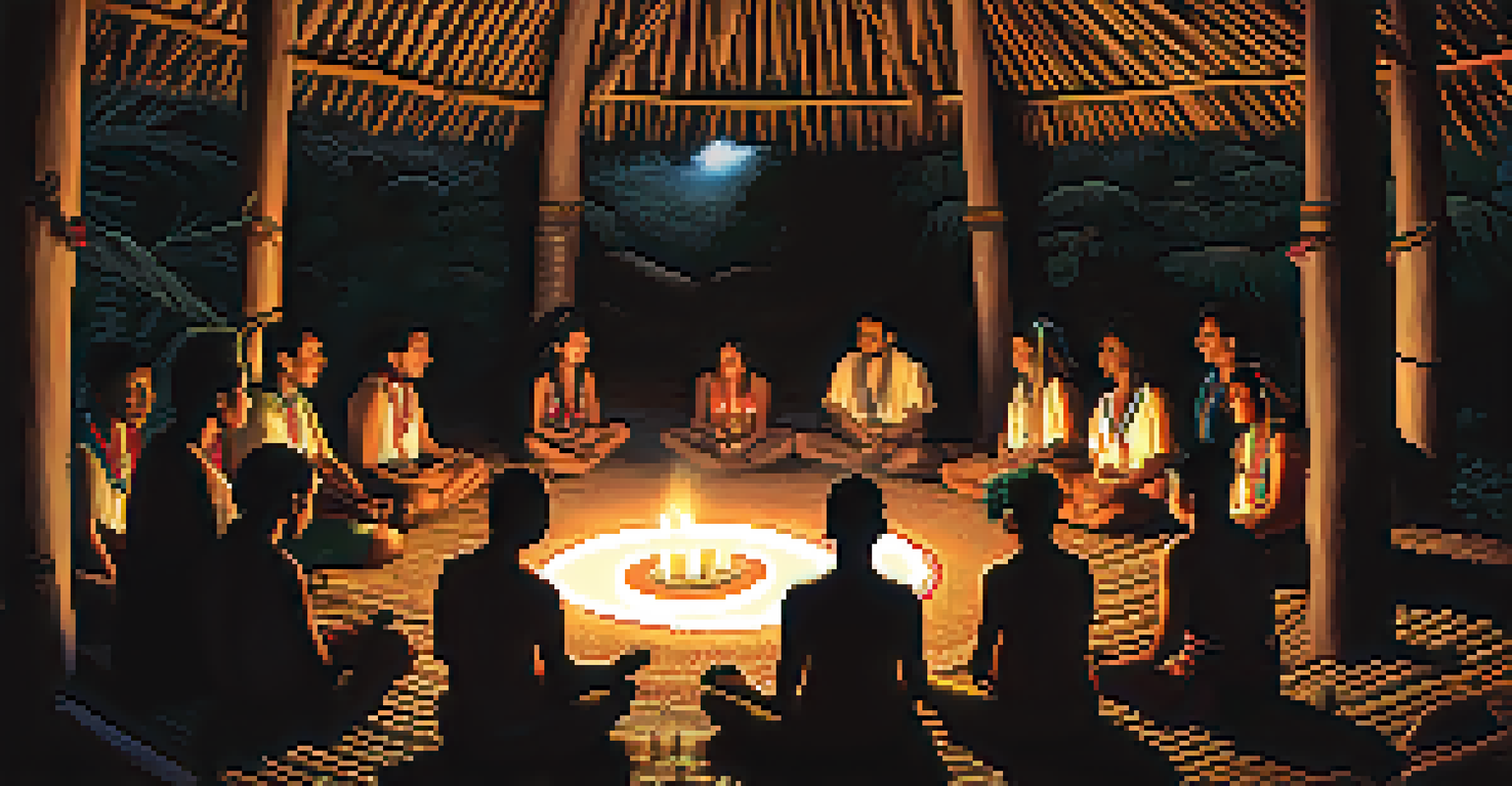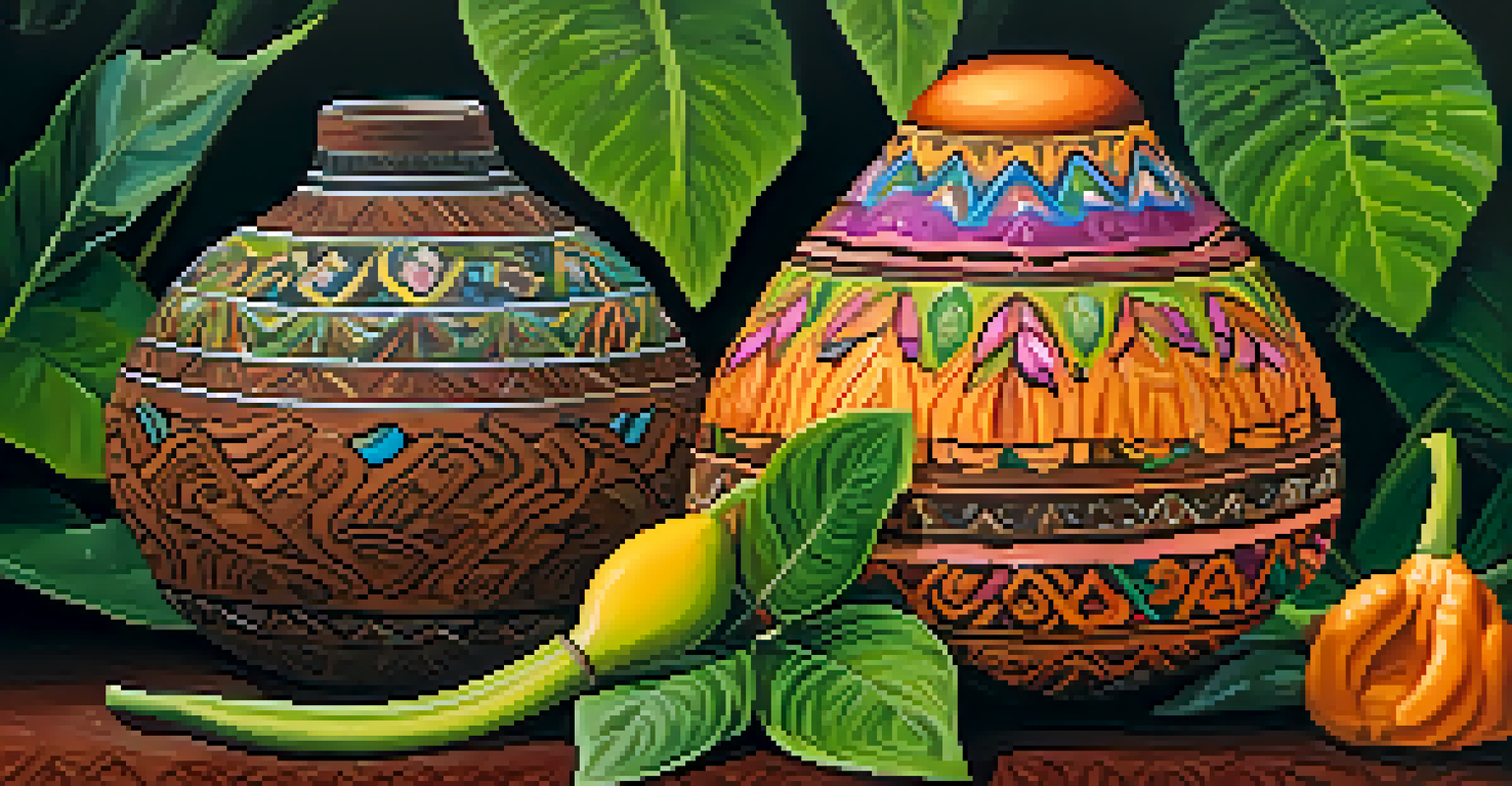Dangers of Misrepresentation in Ayahuasca Contexts

What is Ayahuasca and Its Cultural Significance?
Ayahuasca is a traditional Amazonian brew made from the Banisteriopsis caapi vine and other plants. It's used for spiritual healing and self-discovery, often in guided ceremonies led by experienced shamans. The cultural significance of Ayahuasca runs deep, as it's been part of indigenous practices for centuries, helping individuals connect with their spirituality and the natural world.
Ayahuasca has the potential to be a powerful tool for self-discovery and healing, but it must be approached with respect and understanding of its cultural roots.
However, as Ayahuasca gains popularity outside of its cultural context, there's a tendency for misrepresentation. Many people may view it simply as a recreational drug, overlooking its sacred roots and the profound respect it commands within indigenous communities. This disconnect can lead to a misunderstanding of its purpose and effects.
Misrepresentation can dilute the essence of Ayahuasca, reducing it to a mere trend. This not only disrespects its cultural importance but also poses risks for those seeking genuine experiences. Understanding Ayahuasca's true nature is essential for anyone considering its use.
The Risks of Misleading Information
One of the primary dangers of misrepresentation is the spread of misleading information. Some sources may exaggerate the benefits of Ayahuasca, suggesting it's a cure-all that can solve deep psychological issues or addiction problems. Such claims can lead individuals to approach Ayahuasca with unrealistic expectations, potentially resulting in disappointment or harm.

Additionally, misinformation can promote unsafe practices, such as participating in ceremonies led by unqualified individuals. Without proper guidance, participants may not receive the support they need during intense experiences, leading to overwhelming fear or trauma. This underscores the importance of seeking information from credible sources.
Cultural Significance of Ayahuasca
Ayahuasca is deeply rooted in indigenous spiritual practices, serving as a tool for healing and self-discovery.
In the age of social media, the rapid spread of information can sometimes blur the lines between fact and fiction. It's vital for individuals to critically evaluate where their information about Ayahuasca is coming from and to prioritize safety and authenticity in their journey.
The Role of Shamans in Ayahuasca Ceremonies
Shamans play a crucial role in Ayahuasca ceremonies, serving as guides who facilitate the experience. They possess deep knowledge of the brew and its effects, along with the cultural, spiritual, and healing practices surrounding it. Misrepresentation can undermine the shaman's authority and the integrity of the ceremony, which can be detrimental to participants.
Cultural appropriation is a form of exploitation that not only disrespects the culture being appropriated but can also harm the individuals seeking to benefit from it.
When shamans are misrepresented or when their role is diminished, participants may not receive the comprehensive support they need. This can lead to feelings of confusion or isolation during a vulnerable experience. It's essential to honor the shaman's role in creating a safe and respectful environment for participants.
Moreover, the commercialization of Ayahuasca can lead to the commodification of shamanic traditions. This shift can strip away the spiritual significance of the ceremony, leaving participants without the genuine healing experience they seek. Recognizing the importance of shamans is key to preserving the integrity of Ayahuasca use.
Cultural Appropriation and Its Implications
Cultural appropriation occurs when elements of one culture are taken and used by another, often without understanding or respect for their significance. In the context of Ayahuasca, this can manifest when individuals from outside indigenous communities exploit the brew for personal gain or trendy experiences. Such actions can lead to the erasure of the original culture's meaning and practices.
When Ayahuasca is marketed as a novelty experience, it undermines the rich cultural heritage and spiritual significance it holds for indigenous peoples. This not only disrespects those traditions but can also alienate the very communities that have protected and preserved Ayahuasca for generations. It’s a reminder to approach such practices with humility and respect.
Risks of Misrepresentation
Misleading information about Ayahuasca can lead to unrealistic expectations and unsafe practices, endangering participants' well-being.
Furthermore, cultural appropriation can exacerbate existing inequalities, where profit is generated from a culture without any benefits returning to its originators. By recognizing and addressing these implications, individuals can engage more ethically and responsibly with Ayahuasca and its cultural context.
Mental Health Risks of Misrepresentation
Misrepresentation can lead to serious mental health risks for participants. When individuals are led to believe that Ayahuasca can replace professional treatment for psychological issues, they may neglect seeking appropriate care. This can result in worsening mental health conditions, especially if participants are unprepared for the emotional intensity that Ayahuasca can evoke.
Additionally, the expectation of a 'magical' experience can lead to disillusionment, which may trigger anxiety or depression in those who feel they haven't gotten what they hoped for. It's vital for potential participants to understand that Ayahuasca is not a guaranteed solution and should be approached with caution and preparation.
Educating oneself about the possible psychological effects of Ayahuasca and having realistic expectations can help mitigate these risks. Emphasizing the importance of mental health support before, during, and after the experience is essential for a safer journey with Ayahuasca.
Legal and Ethical Considerations
The legal status of Ayahuasca varies widely around the world, and misrepresentation can lead to legal challenges for participants and facilitators alike. In some countries, Ayahuasca is legal under specific conditions, while in others, it may be banned. Engaging in Ayahuasca ceremonies without understanding the legal framework can lead to unintended consequences, including arrest or legal action.
Ethically, misrepresentation can create scenarios where individuals exploit vulnerable people seeking healing. This raises questions about the responsibility of facilitators to provide honest information about the risks and realities of Ayahuasca use. It's crucial for both participants and facilitators to prioritize ethical practices that respect the cultural roots of Ayahuasca.
Ethical Engagement with Ayahuasca
Approaching Ayahuasca responsibly involves understanding its cultural context, choosing qualified facilitators, and setting realistic expectations.
Being aware of the legal and ethical implications of Ayahuasca use helps create a safer environment for everyone involved. Engaging in open conversations about these considerations can foster a more respectful and responsible approach to Ayahuasca ceremonies.
How to Approach Ayahuasca Responsibly
To engage with Ayahuasca responsibly, start by educating yourself about its cultural background and significance. Look for reputable sources of information, including books, documentaries, and discussions with experienced practitioners. Understanding its roots will help you appreciate the reverence surrounding Ayahuasca and its traditional uses.
Next, find qualified and experienced shamans or facilitators who honor the traditional practices associated with Ayahuasca. Don't hesitate to ask questions about their background, experience, and approach to ceremonies. A genuine facilitator will be open and transparent about their practices, ensuring you feel safe and respected.

Finally, approach Ayahuasca with an open but cautious mindset. Set realistic expectations and be prepared for a potentially challenging experience. By prioritizing safety, respect, and authenticity, you can navigate your Ayahuasca journey in a way that honors its profound cultural significance.